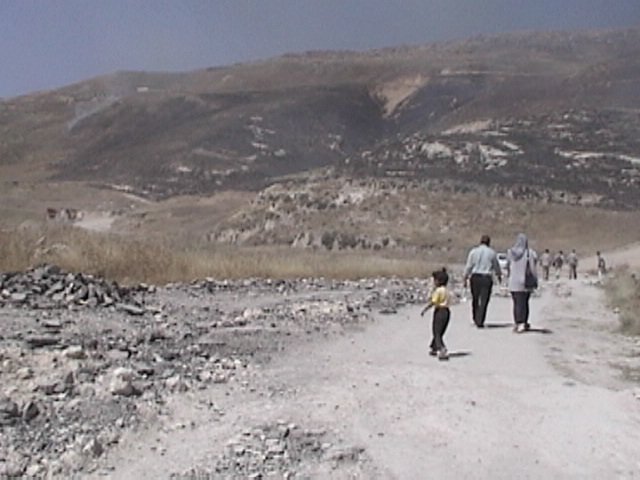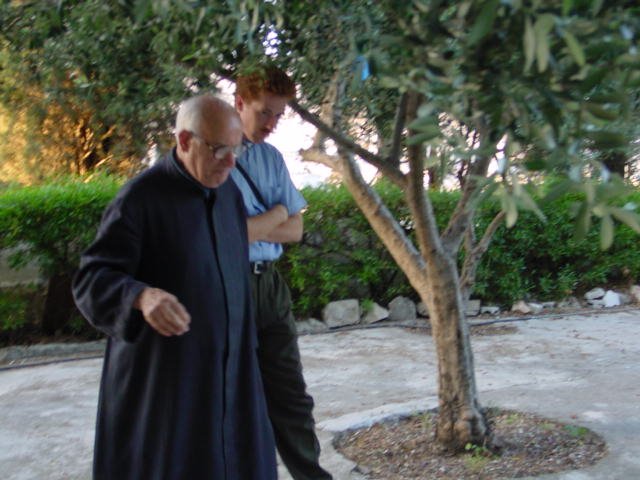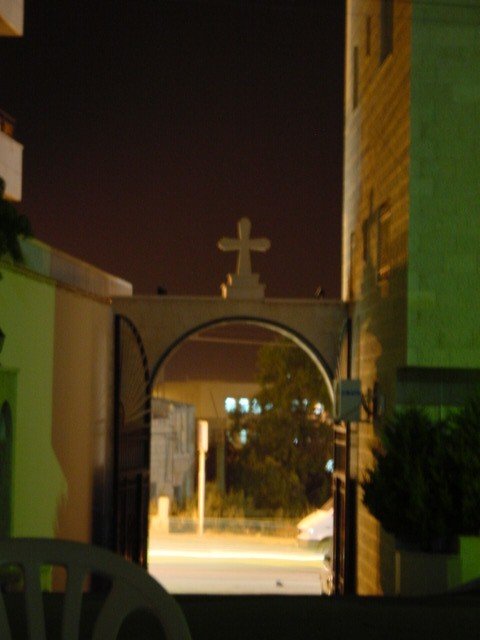June 10, 2002
The long dusty walk to Nablus where the Israeli army destroyed the road.
We headed off for Nablus this morning, as early as possible to beat the heat. It’s amazing how much faster the commute from Zababdeh can be when you don’t try it on a Friday (as Marthame did the last time he went down). We switched taxis in Tubas, then drove up just past the one-time summer playground of Beidan to the beginning of the destroyed road. This has become a familiar passage for us, the twenty minute walk uphill through ankle-deep dust that finely coats our shoes and pantlegs. A local engineer shared our walk, talking about his nearly twenty years living, studying, and working in Texas and West Virginia. Like so many others, he returned to his homeland with the onset of Oslo, believing that finally peace and independence were on the way to Palestine. Now, he and his wife and kids are stuck here, with little work and little hope.
The sun beat down mercilessly as we boarded our final taxi in towards Nablus, which let us off not too far from the Anglican Compound at the edge of the Old City. We did stop on our short walk to share some delicious knaffe nablusiyye (Nablus’s famed cheese sweet) and a lot of icy cold water. There was another Israeli incursion here last week, accompanied by a curfew of four days. People find ways to adapt to the constant going and coming of the army. Somehow they still manage to live their lives, but their financial, physical, and emotional resources have worn dangerously thin.
After dropping off our bags with friends at the convent, cleaning off our shoes and having a cool drink, we walked to the British Council Library to return some books and videos and take advantage of their air-conditioning. They will be closing their doors in March, something extremely unfortunate for us. We're hoping that the school can inherit some of their children's resources to improve our English program.
Fr. Dominic and Marthame walk the grounds of the Missionaries of Charity compound in Nablus.
After catching up with friends over lunch, we headed out to visit with the Missionaries of Charity and Abuna Dominic, the eighty-seven year-old Italian priest who was once in Zababdeh. It’s always a pleasure to visit with him and to walk with him down his memory lane. As we strolled through his garden, two teachers from the Latin School in Nablus returned to the Latin Convent which they are temporarily calling home. They live in the nearby village of Huwara, which has the great misfortune of being situated right on the main settler by-pass road to the south of Nablus. The village has been under curfew since the beginning of the Intifada, almost two years. Four hours a day, the curfew is lifted so people can go shopping and the like. The rest of the time, people are forbidden to leave their homes. These two teachers moved to the Latin Convent so that they could still get to the school in Nablus. By chance, Marthame knows one of them - the two of them were roommates at a computer conference in Tel Aviv just days before Ariel Sharon sparked the flames of the current violence. The conference was meant to bring school children together across the dividing lines through internet projects - those days seem so very distant and hopeful now.
Nablus’ Melkite Church.
The gate of Nablus’ Melkite compound.
We then headed up to Raffidiya to visit with Abuna Yousef at the Melkite Church of St. John the Baptist. Raffidiya was once a Christian village in the Nablus district. Now, it is a mixed neighborhood of sprawling "Greater Nablus." Abuna Yousef's particular concern is for the shrinking, vanishing Christian population in the northern West Bank. He related the stories of which villages around here were once Christian - and not that long ago. He has taken it upon himself to take care of the one or two elderly Christians who remain in villages and cities like Sebastya, Nusf Jubeil, and Tulkarem. He is hoping to build a Christian housing and cultural center on the grounds of the Melkite Convent, but lacks the funding. For the some six hundred Christians in Nablus, it could potentially be a stabilizing force.
We enjoyed the cool evening before heading back to the Anglican Compound. The talk on the street is another Israeli incursion - everyone is sure it will happen tonight, and everyone can give their evidence as to why: the police are out on the streets, the army will pull out of Ramallah and come here, the hospitals have all been contacted, etc. It's never clear how much stock to put in this haki fadi (literally "free talk" - gossip/rumor). The worry merely compounds itself, as each new report sends people home early, which makes the streets quieter, which send more people home, which...




